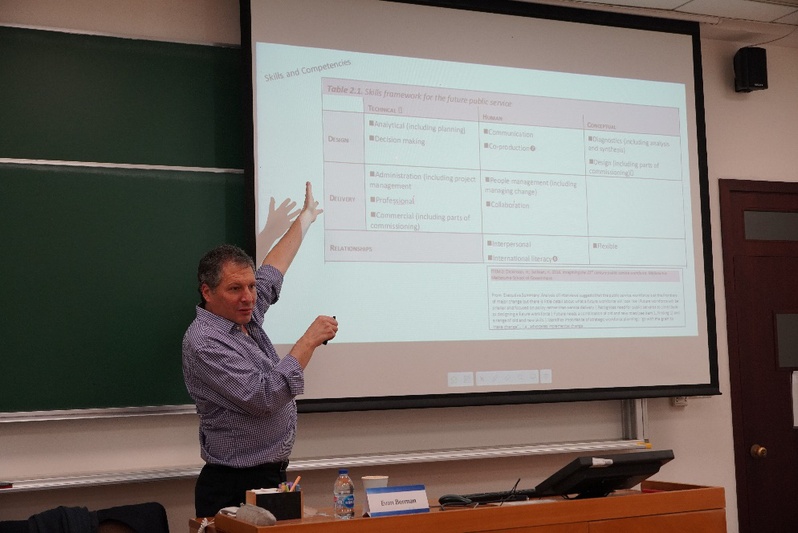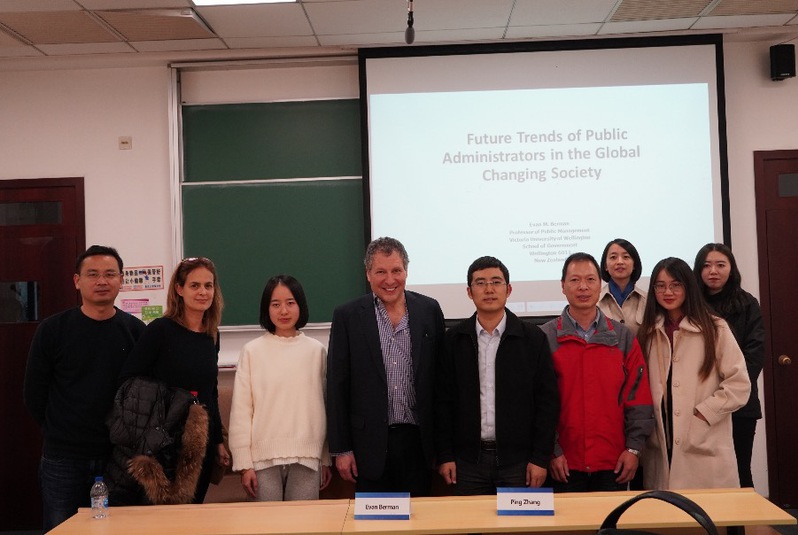
On November 21st, 2019, the 25th lecture of the Fudan-LSE lecture series was successfully held in Room 401 of the West Sub-building of Guanghua Towers at Fudan University. The lecture was organized by the Institute for Global Public Policy (IGPP) of Fudan University. Evan Berman, Professor of Public Administration at Victoria University of Wellington, delivered a lecture on “Future Trends of Public Administrators in the Global Changing Society”. The lecture was moderated by Associate Professor Ping Zhang from the School of International Relations and Public Affairs at Fudan University.
Professor Berman has conducted research on a wide range of topics, including public performance, public leadership, and human resource management in the public sector. His current research focused on public governance in Asia and collaboration between key institutions in the Asia-Pacific region and the United States. One of his recently published books is Leadership and Public Sector Reform in Asia (2018). In addition, Professor Berman received the Fred Riggs Award for Lifetime Achievement in International and Comparative Public Administration in 2015.
Before his lecture, Professor Berman first introduced himself and interacted with the audience to grasp an overview of the academic background and research interests of the audience. The lecture discussed global changes and trends in public administration and the implications for the goals and tasks of public administration in the coming years. Professor Berman divided the lecture into four sections: trends in public administration, competency profiles of public administrators, performance management, and competencies required of public administration scholars.
Regarding the changing trends in public administration, he argued that public administrators are still facing many challenges and that current trends require functional shifts from simple management of organizational structures to solving more complex problems with new methods. The proliferation of local government units leads to the decentralization of urban management, which at the same time foreshadows the possibility of re-centralization in future. In addition, the political apathy of citizens, the growing social governance capacity of governments, the increasing adoption of e-government and the rising demand for government performance management, and the empowerment of citizens are all main features of the changes in public administration.

Professor Berman then presented a vivid diagram showing the roles, attributes, and competencies of different levels of public administrators, followed by a discussion of performance management, and an analysis of the functional requirements, outputs, and performance outcomes of different departments through logic models and examples from different countries. Professor Berman also discussed various important capabilities that future public administration scholars should possess, including anticipating and analysing problems and finding appropriate solutions, learning from the practices of other advanced countries, updating proactively their knowledge base, enhancing their skills in various areas, and working collaboratively with others.
Professor Berman closed the lecture with a conclusion that the competencies of public administrators should be specific and concrete and that they must apply to specific levels and positions. For public administration practitioners, they are about using the right performance management tools, choosing the right methods for performance evaluation, and increasing their own initiative and creativity to achieve results. For scholars, they are about finding solutions to problems and having the best skills and collaboration to contribute to academic research.
At the end of the lecture, Professor Berman interacted with students and faculty members, engaging in a series of discussions on specific issues related to this topic.





